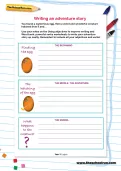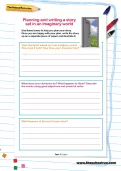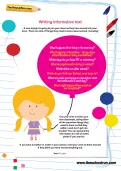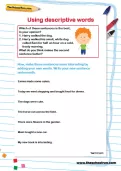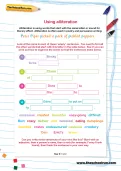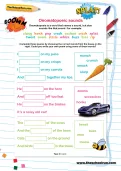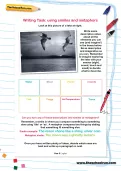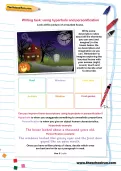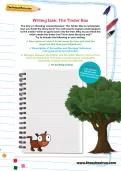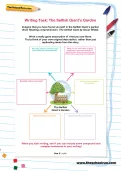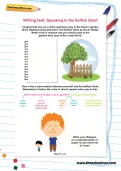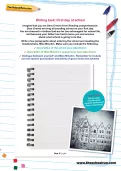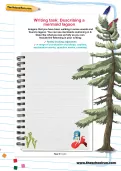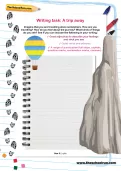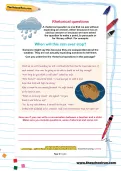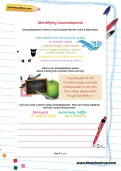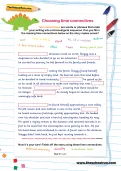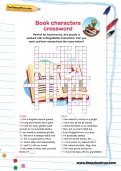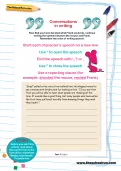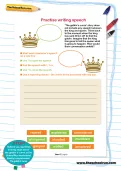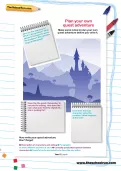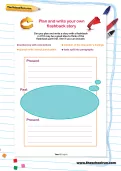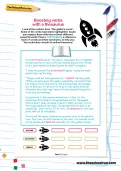Alliteration is the repetition of an initial letter or sound in closely connected words. Cut out the words in the table and sort them so that they are in groups according to their first letter. Now see if you can work out where they go in these sentences.
or
Register to add to your saved resources
Already a subscriber? to view this content.
Onomatopoeia is a word that names a sound, but also sounds like that sound. Complete these poems by choosing the correct words from the boxes on the right. Could you write your own poem using some of these words?
or
Register to add to your saved resources
Already a subscriber? to view this content.
Look at this picture of a lake at night. Write some descriptive notes about all the elements you can see (and imagine!). Be as descriptive and imaginative as you can. Now can you turn any of these descriptions into similes or metaphors?
or
Register to add to your saved resources
Look at this picture of a haunted house. Write some descriptive notes about all the elements you can see (and imagine!). Be as descriptive and imaginative as you can. Remember to imagine exploring the
haunted house with your senses (sight, sound, touch and smell) to decide what to describe. Now, can you improve these descriptions using hyperbole or personification?
or
Register to add to your saved resources
Already a subscriber? to view this content.
The story in Reading comprehension: The Tinder Box is incomplete. Can you finish the story here? You will need to explain what happens to the soldier when he goes down into the tree. Why do you think the witch needs the tinder box? How does the story end? Try to include good adjectives, correct speech punctuation and plenty of good verbs and adverbs in your writing.
or
Register to add to your saved resources
Already a subscriber? to view this content.
Imagine that you have found yourself in the Selfish Giant’s garden (from Reading comprehension: The Selfish Giant by Oscar Wilde). Write a really good description of what you see there. Try to think of your own original description, rather than just replicating ideas from the story.
or
Register to add to your saved resources
Already a subscriber? to view this content.
Imagine that you are a child wanting to play in the Selfish Giant’s garden. Write a list of reasons why you want to play in the garden here (just write in note form).
or
Register to add to your saved resources
Already a subscriber? to view this content.
Imagine that you are Sara Crewe (from Reading comprehension: Sara Crewe) arriving at boarding school on your first day. You are dressed in clothes that are far too extravagant for school life, sad because your father has had to leave you and anxious about what school is going to be like. Write a few paragraphs about entering the school and meeting the headmistress, Miss Minchin.
or
Register to add to your saved resources
Already a subscriber? to view this content.
Imagine that you have been walking in some woods and found a lagoon. You can see mermaids swimming in it. Describe what you see as fully as you can.
or
Register to add to your saved resources
Already a subscriber? to view this content.
Imagine that you are travelling alone somewhere. How are you travelling? How do you feel about the journey? What kinds of things do you see? See if you can include good adjectives, verbs and adverbs and a range of punctuation in your writing.
or
Register to add to your saved resources
Already a subscriber? to view this content.
A rhetorical question is one that we ask without expecting an answer, either because it has an obvious answer or because we have asked the question to make a point, to persuade or for literary effect. Now see if you can write a conversation between a teacher and a child. Make sure you include questions, some rhetorical and some not.
or
Register to add to your saved resources
Already a subscriber? to view this content.
Onomatopoeia is when a word sounds like the noise it describes. Can you write a poem using onomatopoeia? Here are some subjects that you could choose from.
or
Register to add to your saved resources
Already a subscriber? to view this content.
Time connectives are words or phrases that order your writing into a chronological sequence. Can you fill in the missing time connectives below so the story makes sense?
or
Register to add to your saved resources
Already a subscriber? to view this content.
Classic characters are unforgettable, whether they're falling down unusual rabbit holes, prowling through the jungle or breaking their slates over unfortunate classmates' heads. How many famous characters from children's literature can you identify in this crossword puzzle?
or
Register to add to your saved resources
Green or barren, deserted or populated by amazing creatures – it's time to enter an imaginary world! Your child will need to write a story set in an environment of their choosing, using the planning frame to help them organise their ideas before they put pen to paper.
or
Register to add to your saved resources
Continue a conversation between two characters, remembering the rules of writing speech: Start each character’s speech on a new line, use “ to open the speech, end the speech with !, ? or , and use ” to close the speech. Don't forget to use a reporting clause (for example: shouted the mouse, replied Frank), too!
or
Register to add to your saved resources
Already a subscriber? to view this content.
‘The goblin’s curse’ story does not include any speech between the king and queen. Think back to the moment when the king has sent Orion off to find the goblin. Imagine that the king has gone to tell the queen what is going to happen. How would their conversation unfold?
or
Register to add to your saved resources
Already a subscriber? to view this content.
Make some notes to plan your own quest adventure before you write it. Who are the characters? What is the problem? What needs to be found to solve the problem? Who decides to go on the quest? Now write up your quest adventure, but don’t forget: description of characters and setting; paragraphs to show different sections of story; correctly punctuated speech between characters; powerful verbs and adverbs to describe any action.
or
Register to add to your saved resources
Already a subscriber? to view this content.
Can you plan and write a story with a flashback in it? It may be a good idea to think of the flashback part first. See if you can include: sentences with connectives; speech with correct punctuation; mention of the character’s feelings; texts split into paragraphs.
or
Register to add to your saved resources
Already a subscriber? to view this content.
Look at this extract from ‘The goblin’s curse’. Some of the verbs have been highlighted. Could you replace them with two or three different, powerful verbs? Use a THESAURUS, a reference book of words and their synonyms, to help you. You could also consult an online thesaurus!
or
Register to add to your saved resources
Already a subscriber? to view this content.

